CPD1102 - Learning and Development Plan: Professional Growth
VerifiedAdded on 2022/10/02
|12
|2997
|26
Report
AI Summary
This Learning and Development Plan outlines a student's approach to professional growth, focusing on transitioning from mechanical engineering to a project management role. The plan begins with a self-introduction, highlighting the student's experience and career aspirations. It then analyzes megatrends and challenges in the manufacturing industry, identifying the need for skilled labor, effective communication, and cultural competence. The student sets specific, measurable, achievable, relevant, and time-bound goals to secure a project management position in an automobile company. The plan emphasizes the importance of ethical and professional values, including integrity, quality of work, adaptability, and professionalism. A competency assessment is conducted, identifying strengths in teamwork, decision-making, and problem-solving, while also recognizing areas for development such as leadership skills and cultural competence. The plan aims to leverage existing skills and address weaknesses to achieve career objectives within a specified timeframe.
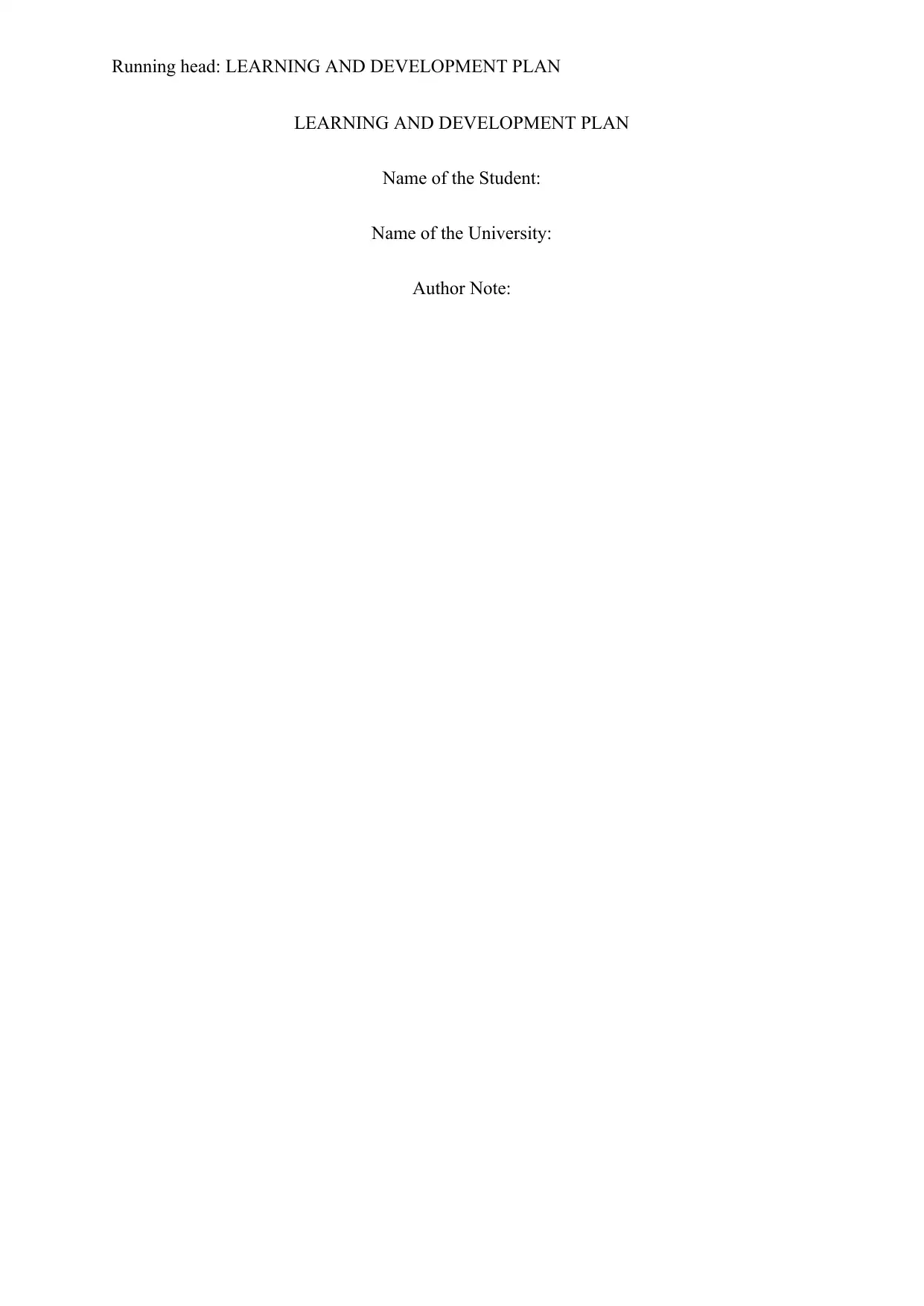
Running head: LEARNING AND DEVELOPMENT PLAN
LEARNING AND DEVELOPMENT PLAN
Name of the Student:
Name of the University:
Author Note:
LEARNING AND DEVELOPMENT PLAN
Name of the Student:
Name of the University:
Author Note:
Paraphrase This Document
Need a fresh take? Get an instant paraphrase of this document with our AI Paraphraser
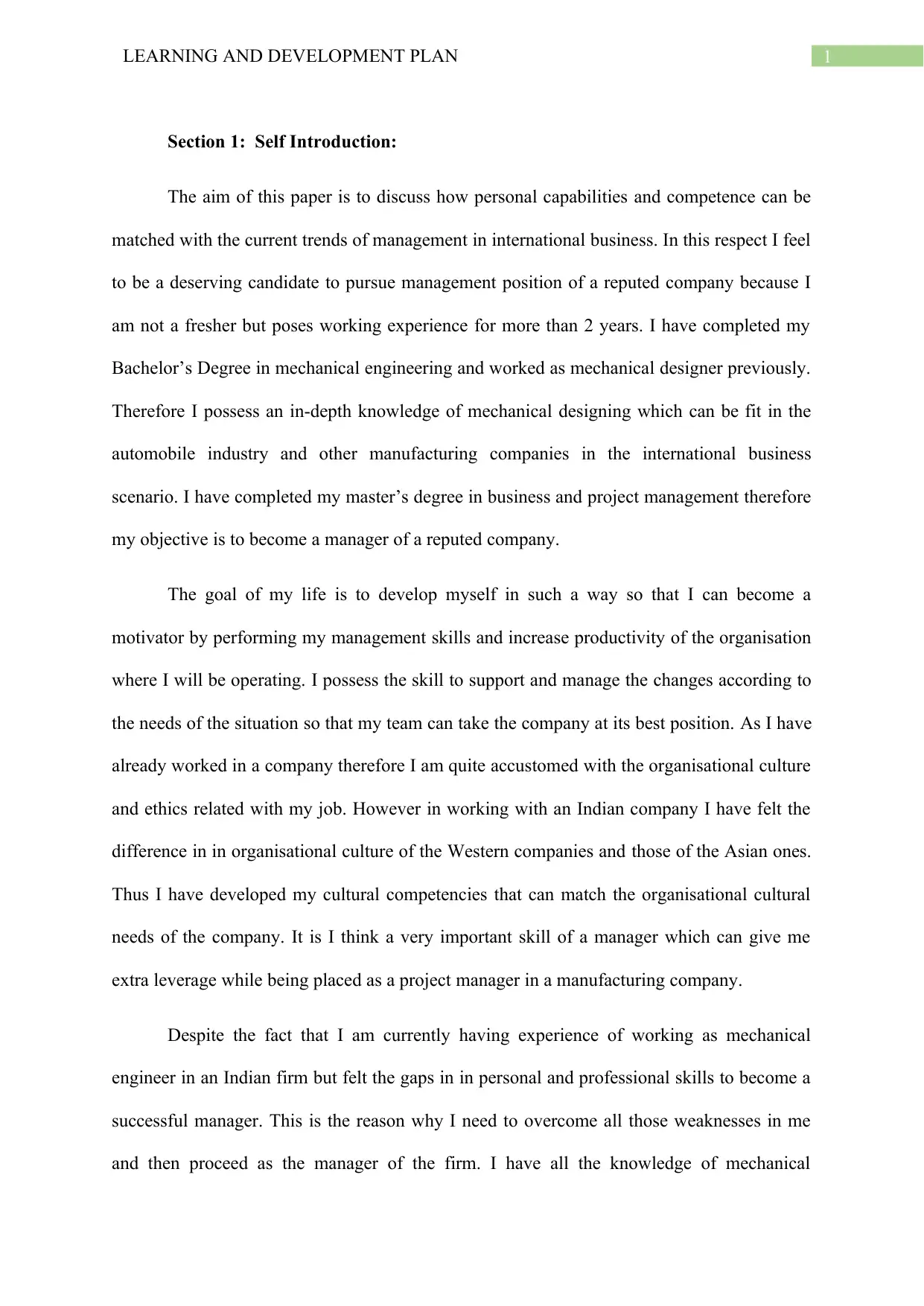
1LEARNING AND DEVELOPMENT PLAN
Section 1: Self Introduction:
The aim of this paper is to discuss how personal capabilities and competence can be
matched with the current trends of management in international business. In this respect I feel
to be a deserving candidate to pursue management position of a reputed company because I
am not a fresher but poses working experience for more than 2 years. I have completed my
Bachelor’s Degree in mechanical engineering and worked as mechanical designer previously.
Therefore I possess an in-depth knowledge of mechanical designing which can be fit in the
automobile industry and other manufacturing companies in the international business
scenario. I have completed my master’s degree in business and project management therefore
my objective is to become a manager of a reputed company.
The goal of my life is to develop myself in such a way so that I can become a
motivator by performing my management skills and increase productivity of the organisation
where I will be operating. I possess the skill to support and manage the changes according to
the needs of the situation so that my team can take the company at its best position. As I have
already worked in a company therefore I am quite accustomed with the organisational culture
and ethics related with my job. However in working with an Indian company I have felt the
difference in in organisational culture of the Western companies and those of the Asian ones.
Thus I have developed my cultural competencies that can match the organisational cultural
needs of the company. It is I think a very important skill of a manager which can give me
extra leverage while being placed as a project manager in a manufacturing company.
Despite the fact that I am currently having experience of working as mechanical
engineer in an Indian firm but felt the gaps in in personal and professional skills to become a
successful manager. This is the reason why I need to overcome all those weaknesses in me
and then proceed as the manager of the firm. I have all the knowledge of mechanical
Section 1: Self Introduction:
The aim of this paper is to discuss how personal capabilities and competence can be
matched with the current trends of management in international business. In this respect I feel
to be a deserving candidate to pursue management position of a reputed company because I
am not a fresher but poses working experience for more than 2 years. I have completed my
Bachelor’s Degree in mechanical engineering and worked as mechanical designer previously.
Therefore I possess an in-depth knowledge of mechanical designing which can be fit in the
automobile industry and other manufacturing companies in the international business
scenario. I have completed my master’s degree in business and project management therefore
my objective is to become a manager of a reputed company.
The goal of my life is to develop myself in such a way so that I can become a
motivator by performing my management skills and increase productivity of the organisation
where I will be operating. I possess the skill to support and manage the changes according to
the needs of the situation so that my team can take the company at its best position. As I have
already worked in a company therefore I am quite accustomed with the organisational culture
and ethics related with my job. However in working with an Indian company I have felt the
difference in in organisational culture of the Western companies and those of the Asian ones.
Thus I have developed my cultural competencies that can match the organisational cultural
needs of the company. It is I think a very important skill of a manager which can give me
extra leverage while being placed as a project manager in a manufacturing company.
Despite the fact that I am currently having experience of working as mechanical
engineer in an Indian firm but felt the gaps in in personal and professional skills to become a
successful manager. This is the reason why I need to overcome all those weaknesses in me
and then proceed as the manager of the firm. I have all the knowledge of mechanical
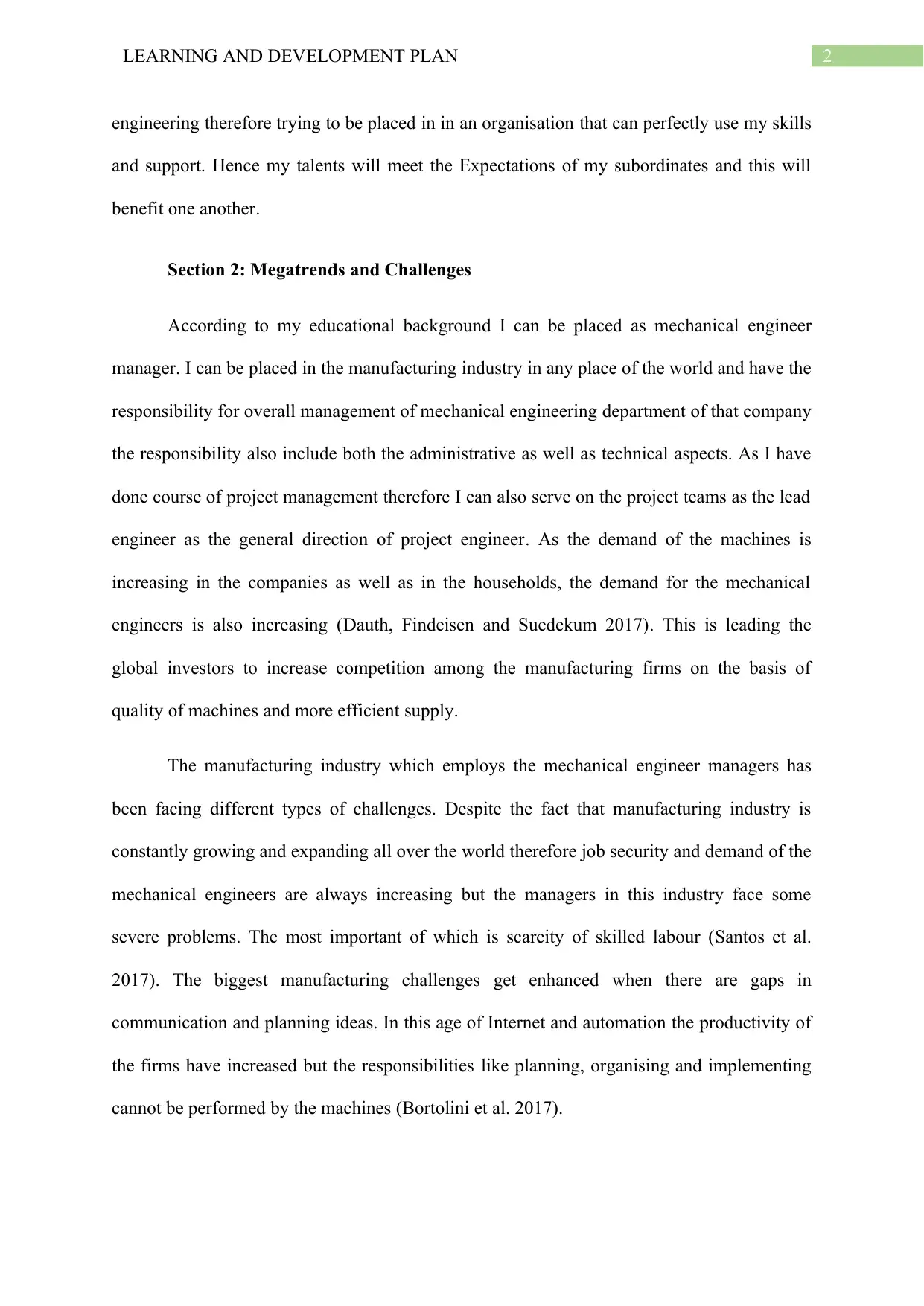
2LEARNING AND DEVELOPMENT PLAN
engineering therefore trying to be placed in in an organisation that can perfectly use my skills
and support. Hence my talents will meet the Expectations of my subordinates and this will
benefit one another.
Section 2: Megatrends and Challenges
According to my educational background I can be placed as mechanical engineer
manager. I can be placed in the manufacturing industry in any place of the world and have the
responsibility for overall management of mechanical engineering department of that company
the responsibility also include both the administrative as well as technical aspects. As I have
done course of project management therefore I can also serve on the project teams as the lead
engineer as the general direction of project engineer. As the demand of the machines is
increasing in the companies as well as in the households, the demand for the mechanical
engineers is also increasing (Dauth, Findeisen and Suedekum 2017). This is leading the
global investors to increase competition among the manufacturing firms on the basis of
quality of machines and more efficient supply.
The manufacturing industry which employs the mechanical engineer managers has
been facing different types of challenges. Despite the fact that manufacturing industry is
constantly growing and expanding all over the world therefore job security and demand of the
mechanical engineers are always increasing but the managers in this industry face some
severe problems. The most important of which is scarcity of skilled labour (Santos et al.
2017). The biggest manufacturing challenges get enhanced when there are gaps in
communication and planning ideas. In this age of Internet and automation the productivity of
the firms have increased but the responsibilities like planning, organising and implementing
cannot be performed by the machines (Bortolini et al. 2017).
engineering therefore trying to be placed in in an organisation that can perfectly use my skills
and support. Hence my talents will meet the Expectations of my subordinates and this will
benefit one another.
Section 2: Megatrends and Challenges
According to my educational background I can be placed as mechanical engineer
manager. I can be placed in the manufacturing industry in any place of the world and have the
responsibility for overall management of mechanical engineering department of that company
the responsibility also include both the administrative as well as technical aspects. As I have
done course of project management therefore I can also serve on the project teams as the lead
engineer as the general direction of project engineer. As the demand of the machines is
increasing in the companies as well as in the households, the demand for the mechanical
engineers is also increasing (Dauth, Findeisen and Suedekum 2017). This is leading the
global investors to increase competition among the manufacturing firms on the basis of
quality of machines and more efficient supply.
The manufacturing industry which employs the mechanical engineer managers has
been facing different types of challenges. Despite the fact that manufacturing industry is
constantly growing and expanding all over the world therefore job security and demand of the
mechanical engineers are always increasing but the managers in this industry face some
severe problems. The most important of which is scarcity of skilled labour (Santos et al.
2017). The biggest manufacturing challenges get enhanced when there are gaps in
communication and planning ideas. In this age of Internet and automation the productivity of
the firms have increased but the responsibilities like planning, organising and implementing
cannot be performed by the machines (Bortolini et al. 2017).
⊘ This is a preview!⊘
Do you want full access?
Subscribe today to unlock all pages.

Trusted by 1+ million students worldwide
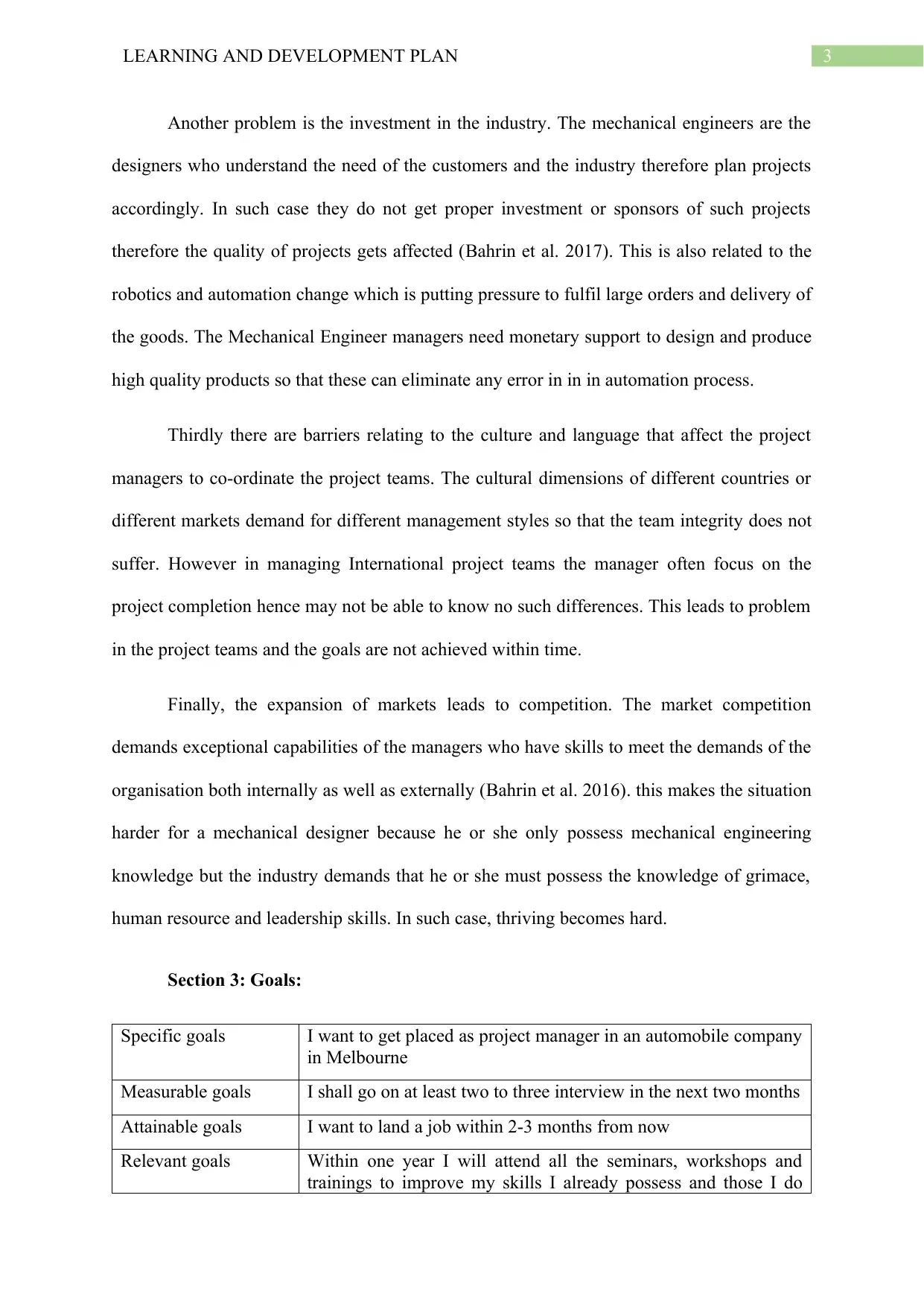
3LEARNING AND DEVELOPMENT PLAN
Another problem is the investment in the industry. The mechanical engineers are the
designers who understand the need of the customers and the industry therefore plan projects
accordingly. In such case they do not get proper investment or sponsors of such projects
therefore the quality of projects gets affected (Bahrin et al. 2017). This is also related to the
robotics and automation change which is putting pressure to fulfil large orders and delivery of
the goods. The Mechanical Engineer managers need monetary support to design and produce
high quality products so that these can eliminate any error in in in automation process.
Thirdly there are barriers relating to the culture and language that affect the project
managers to co-ordinate the project teams. The cultural dimensions of different countries or
different markets demand for different management styles so that the team integrity does not
suffer. However in managing International project teams the manager often focus on the
project completion hence may not be able to know no such differences. This leads to problem
in the project teams and the goals are not achieved within time.
Finally, the expansion of markets leads to competition. The market competition
demands exceptional capabilities of the managers who have skills to meet the demands of the
organisation both internally as well as externally (Bahrin et al. 2016). this makes the situation
harder for a mechanical designer because he or she only possess mechanical engineering
knowledge but the industry demands that he or she must possess the knowledge of grimace,
human resource and leadership skills. In such case, thriving becomes hard.
Section 3: Goals:
Specific goals I want to get placed as project manager in an automobile company
in Melbourne
Measurable goals I shall go on at least two to three interview in the next two months
Attainable goals I want to land a job within 2-3 months from now
Relevant goals Within one year I will attend all the seminars, workshops and
trainings to improve my skills I already possess and those I do
Another problem is the investment in the industry. The mechanical engineers are the
designers who understand the need of the customers and the industry therefore plan projects
accordingly. In such case they do not get proper investment or sponsors of such projects
therefore the quality of projects gets affected (Bahrin et al. 2017). This is also related to the
robotics and automation change which is putting pressure to fulfil large orders and delivery of
the goods. The Mechanical Engineer managers need monetary support to design and produce
high quality products so that these can eliminate any error in in in automation process.
Thirdly there are barriers relating to the culture and language that affect the project
managers to co-ordinate the project teams. The cultural dimensions of different countries or
different markets demand for different management styles so that the team integrity does not
suffer. However in managing International project teams the manager often focus on the
project completion hence may not be able to know no such differences. This leads to problem
in the project teams and the goals are not achieved within time.
Finally, the expansion of markets leads to competition. The market competition
demands exceptional capabilities of the managers who have skills to meet the demands of the
organisation both internally as well as externally (Bahrin et al. 2016). this makes the situation
harder for a mechanical designer because he or she only possess mechanical engineering
knowledge but the industry demands that he or she must possess the knowledge of grimace,
human resource and leadership skills. In such case, thriving becomes hard.
Section 3: Goals:
Specific goals I want to get placed as project manager in an automobile company
in Melbourne
Measurable goals I shall go on at least two to three interview in the next two months
Attainable goals I want to land a job within 2-3 months from now
Relevant goals Within one year I will attend all the seminars, workshops and
trainings to improve my skills I already possess and those I do
Paraphrase This Document
Need a fresh take? Get an instant paraphrase of this document with our AI Paraphraser
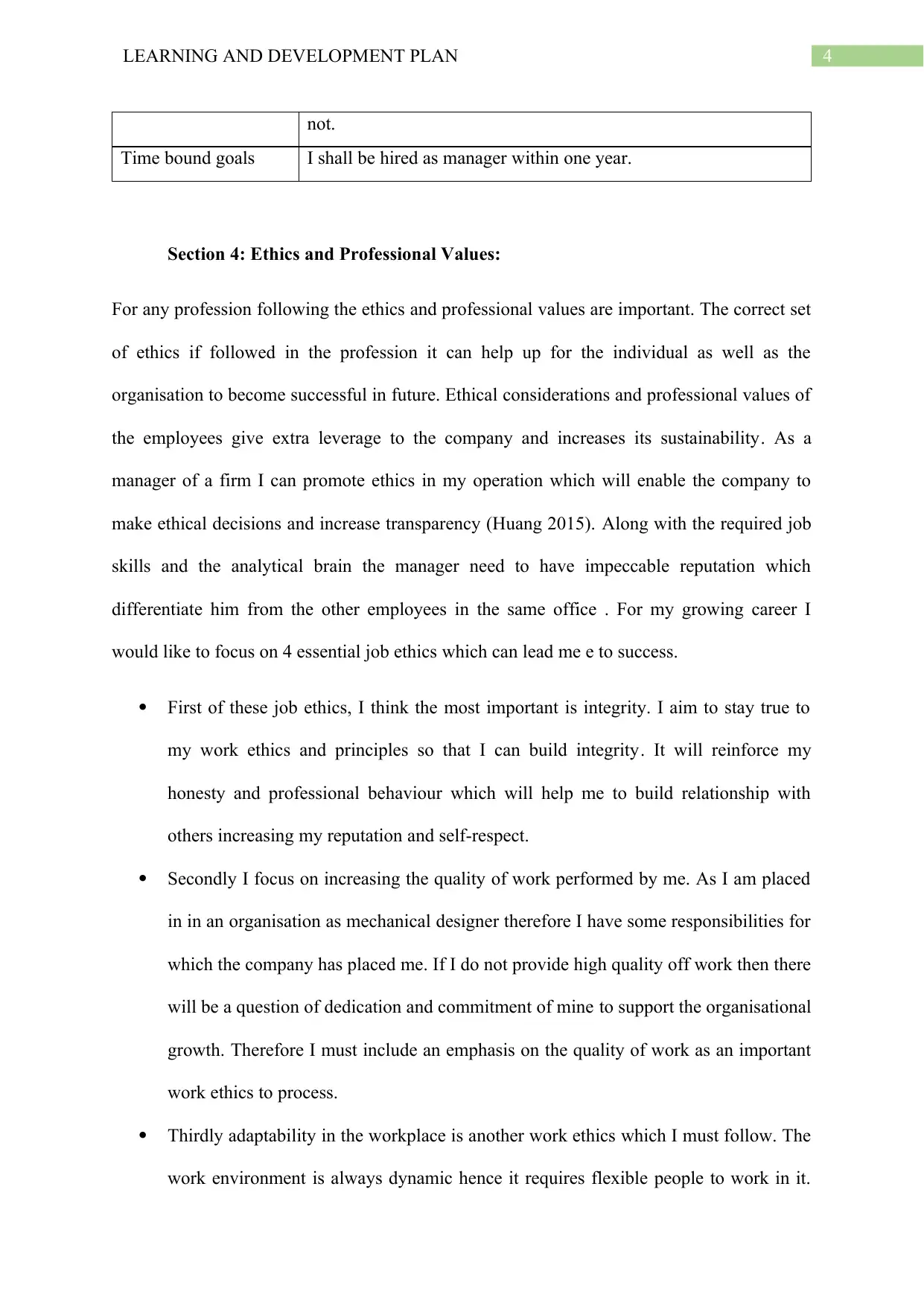
4LEARNING AND DEVELOPMENT PLAN
not.
Time bound goals I shall be hired as manager within one year.
Section 4: Ethics and Professional Values:
For any profession following the ethics and professional values are important. The correct set
of ethics if followed in the profession it can help up for the individual as well as the
organisation to become successful in future. Ethical considerations and professional values of
the employees give extra leverage to the company and increases its sustainability. As a
manager of a firm I can promote ethics in my operation which will enable the company to
make ethical decisions and increase transparency (Huang 2015). Along with the required job
skills and the analytical brain the manager need to have impeccable reputation which
differentiate him from the other employees in the same office . For my growing career I
would like to focus on 4 essential job ethics which can lead me e to success.
First of these job ethics, I think the most important is integrity. I aim to stay true to
my work ethics and principles so that I can build integrity. It will reinforce my
honesty and professional behaviour which will help me to build relationship with
others increasing my reputation and self-respect.
Secondly I focus on increasing the quality of work performed by me. As I am placed
in in an organisation as mechanical designer therefore I have some responsibilities for
which the company has placed me. If I do not provide high quality off work then there
will be a question of dedication and commitment of mine to support the organisational
growth. Therefore I must include an emphasis on the quality of work as an important
work ethics to process.
Thirdly adaptability in the workplace is another work ethics which I must follow. The
work environment is always dynamic hence it requires flexible people to work in it.
not.
Time bound goals I shall be hired as manager within one year.
Section 4: Ethics and Professional Values:
For any profession following the ethics and professional values are important. The correct set
of ethics if followed in the profession it can help up for the individual as well as the
organisation to become successful in future. Ethical considerations and professional values of
the employees give extra leverage to the company and increases its sustainability. As a
manager of a firm I can promote ethics in my operation which will enable the company to
make ethical decisions and increase transparency (Huang 2015). Along with the required job
skills and the analytical brain the manager need to have impeccable reputation which
differentiate him from the other employees in the same office . For my growing career I
would like to focus on 4 essential job ethics which can lead me e to success.
First of these job ethics, I think the most important is integrity. I aim to stay true to
my work ethics and principles so that I can build integrity. It will reinforce my
honesty and professional behaviour which will help me to build relationship with
others increasing my reputation and self-respect.
Secondly I focus on increasing the quality of work performed by me. As I am placed
in in an organisation as mechanical designer therefore I have some responsibilities for
which the company has placed me. If I do not provide high quality off work then there
will be a question of dedication and commitment of mine to support the organisational
growth. Therefore I must include an emphasis on the quality of work as an important
work ethics to process.
Thirdly adaptability in the workplace is another work ethics which I must follow. The
work environment is always dynamic hence it requires flexible people to work in it.
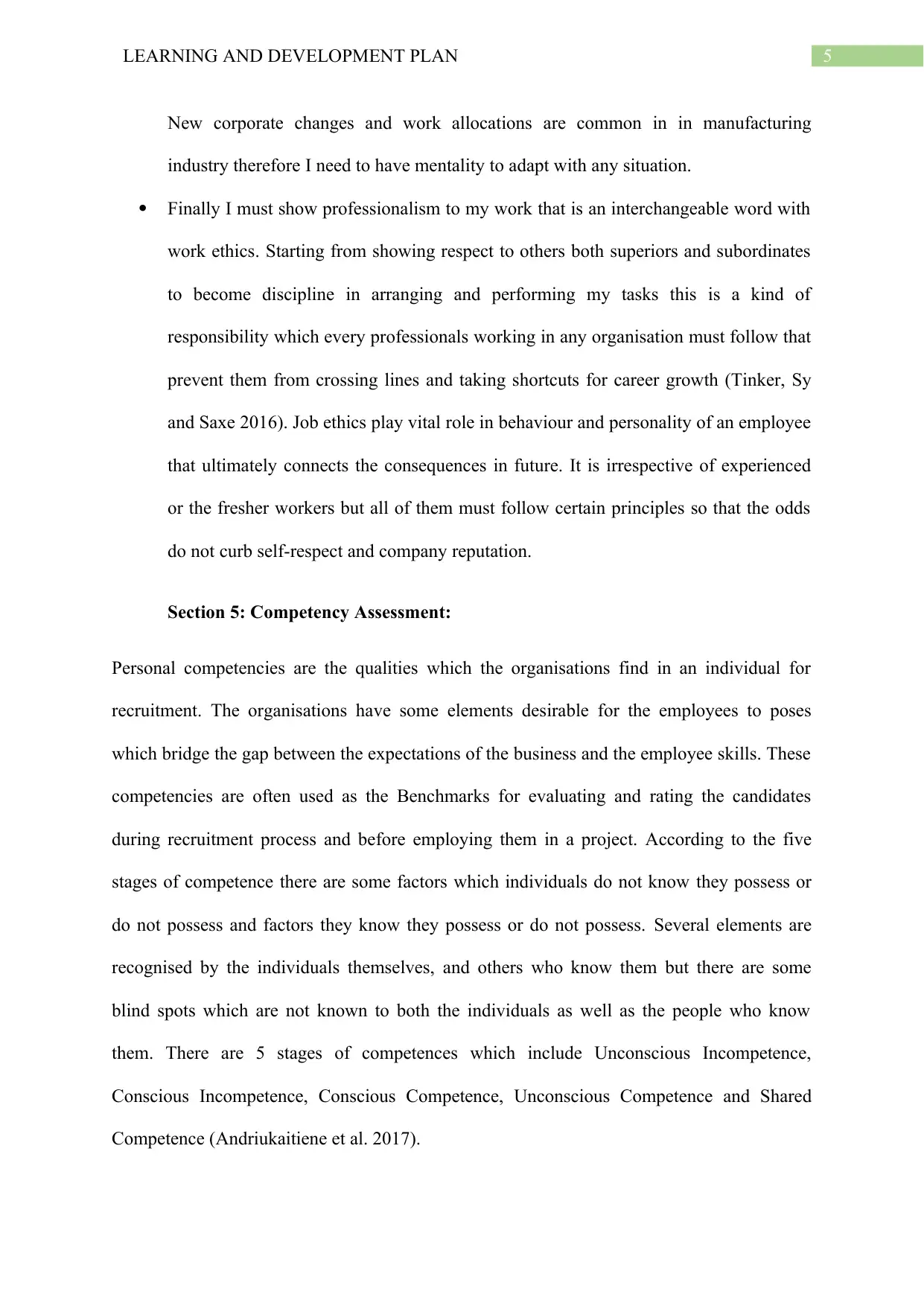
5LEARNING AND DEVELOPMENT PLAN
New corporate changes and work allocations are common in in manufacturing
industry therefore I need to have mentality to adapt with any situation.
Finally I must show professionalism to my work that is an interchangeable word with
work ethics. Starting from showing respect to others both superiors and subordinates
to become discipline in arranging and performing my tasks this is a kind of
responsibility which every professionals working in any organisation must follow that
prevent them from crossing lines and taking shortcuts for career growth (Tinker, Sy
and Saxe 2016). Job ethics play vital role in behaviour and personality of an employee
that ultimately connects the consequences in future. It is irrespective of experienced
or the fresher workers but all of them must follow certain principles so that the odds
do not curb self-respect and company reputation.
Section 5: Competency Assessment:
Personal competencies are the qualities which the organisations find in an individual for
recruitment. The organisations have some elements desirable for the employees to poses
which bridge the gap between the expectations of the business and the employee skills. These
competencies are often used as the Benchmarks for evaluating and rating the candidates
during recruitment process and before employing them in a project. According to the five
stages of competence there are some factors which individuals do not know they possess or
do not possess and factors they know they possess or do not possess. Several elements are
recognised by the individuals themselves, and others who know them but there are some
blind spots which are not known to both the individuals as well as the people who know
them. There are 5 stages of competences which include Unconscious Incompetence,
Conscious Incompetence, Conscious Competence, Unconscious Competence and Shared
Competence (Аndriukaitiene et al. 2017).
New corporate changes and work allocations are common in in manufacturing
industry therefore I need to have mentality to adapt with any situation.
Finally I must show professionalism to my work that is an interchangeable word with
work ethics. Starting from showing respect to others both superiors and subordinates
to become discipline in arranging and performing my tasks this is a kind of
responsibility which every professionals working in any organisation must follow that
prevent them from crossing lines and taking shortcuts for career growth (Tinker, Sy
and Saxe 2016). Job ethics play vital role in behaviour and personality of an employee
that ultimately connects the consequences in future. It is irrespective of experienced
or the fresher workers but all of them must follow certain principles so that the odds
do not curb self-respect and company reputation.
Section 5: Competency Assessment:
Personal competencies are the qualities which the organisations find in an individual for
recruitment. The organisations have some elements desirable for the employees to poses
which bridge the gap between the expectations of the business and the employee skills. These
competencies are often used as the Benchmarks for evaluating and rating the candidates
during recruitment process and before employing them in a project. According to the five
stages of competence there are some factors which individuals do not know they possess or
do not possess and factors they know they possess or do not possess. Several elements are
recognised by the individuals themselves, and others who know them but there are some
blind spots which are not known to both the individuals as well as the people who know
them. There are 5 stages of competences which include Unconscious Incompetence,
Conscious Incompetence, Conscious Competence, Unconscious Competence and Shared
Competence (Аndriukaitiene et al. 2017).
⊘ This is a preview!⊘
Do you want full access?
Subscribe today to unlock all pages.

Trusted by 1+ million students worldwide
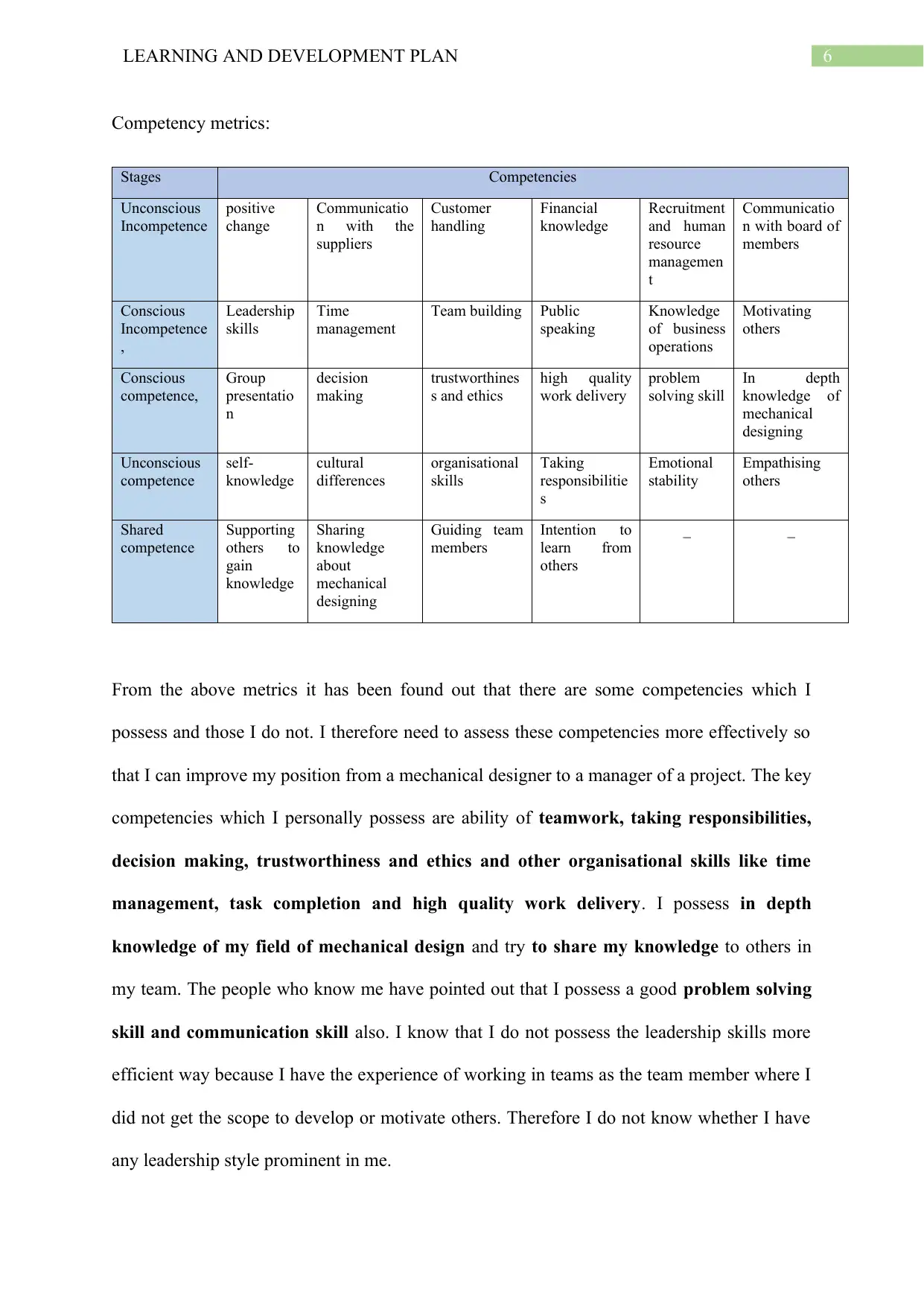
6LEARNING AND DEVELOPMENT PLAN
Competency metrics:
Stages Competencies
Unconscious
Incompetence
positive
change
Communicatio
n with the
suppliers
Customer
handling
Financial
knowledge
Recruitment
and human
resource
managemen
t
Communicatio
n with board of
members
Conscious
Incompetence
,
Leadership
skills
Time
management
Team building Public
speaking
Knowledge
of business
operations
Motivating
others
Conscious
competence,
Group
presentatio
n
decision
making
trustworthines
s and ethics
high quality
work delivery
problem
solving skill
In depth
knowledge of
mechanical
designing
Unconscious
competence
self-
knowledge
cultural
differences
organisational
skills
Taking
responsibilitie
s
Emotional
stability
Empathising
others
Shared
competence
Supporting
others to
gain
knowledge
Sharing
knowledge
about
mechanical
designing
Guiding team
members
Intention to
learn from
others
_ _
From the above metrics it has been found out that there are some competencies which I
possess and those I do not. I therefore need to assess these competencies more effectively so
that I can improve my position from a mechanical designer to a manager of a project. The key
competencies which I personally possess are ability of teamwork, taking responsibilities,
decision making, trustworthiness and ethics and other organisational skills like time
management, task completion and high quality work delivery. I possess in depth
knowledge of my field of mechanical design and try to share my knowledge to others in
my team. The people who know me have pointed out that I possess a good problem solving
skill and communication skill also. I know that I do not possess the leadership skills more
efficient way because I have the experience of working in teams as the team member where I
did not get the scope to develop or motivate others. Therefore I do not know whether I have
any leadership style prominent in me.
Competency metrics:
Stages Competencies
Unconscious
Incompetence
positive
change
Communicatio
n with the
suppliers
Customer
handling
Financial
knowledge
Recruitment
and human
resource
managemen
t
Communicatio
n with board of
members
Conscious
Incompetence
,
Leadership
skills
Time
management
Team building Public
speaking
Knowledge
of business
operations
Motivating
others
Conscious
competence,
Group
presentatio
n
decision
making
trustworthines
s and ethics
high quality
work delivery
problem
solving skill
In depth
knowledge of
mechanical
designing
Unconscious
competence
self-
knowledge
cultural
differences
organisational
skills
Taking
responsibilitie
s
Emotional
stability
Empathising
others
Shared
competence
Supporting
others to
gain
knowledge
Sharing
knowledge
about
mechanical
designing
Guiding team
members
Intention to
learn from
others
_ _
From the above metrics it has been found out that there are some competencies which I
possess and those I do not. I therefore need to assess these competencies more effectively so
that I can improve my position from a mechanical designer to a manager of a project. The key
competencies which I personally possess are ability of teamwork, taking responsibilities,
decision making, trustworthiness and ethics and other organisational skills like time
management, task completion and high quality work delivery. I possess in depth
knowledge of my field of mechanical design and try to share my knowledge to others in
my team. The people who know me have pointed out that I possess a good problem solving
skill and communication skill also. I know that I do not possess the leadership skills more
efficient way because I have the experience of working in teams as the team member where I
did not get the scope to develop or motivate others. Therefore I do not know whether I have
any leadership style prominent in me.
Paraphrase This Document
Need a fresh take? Get an instant paraphrase of this document with our AI Paraphraser
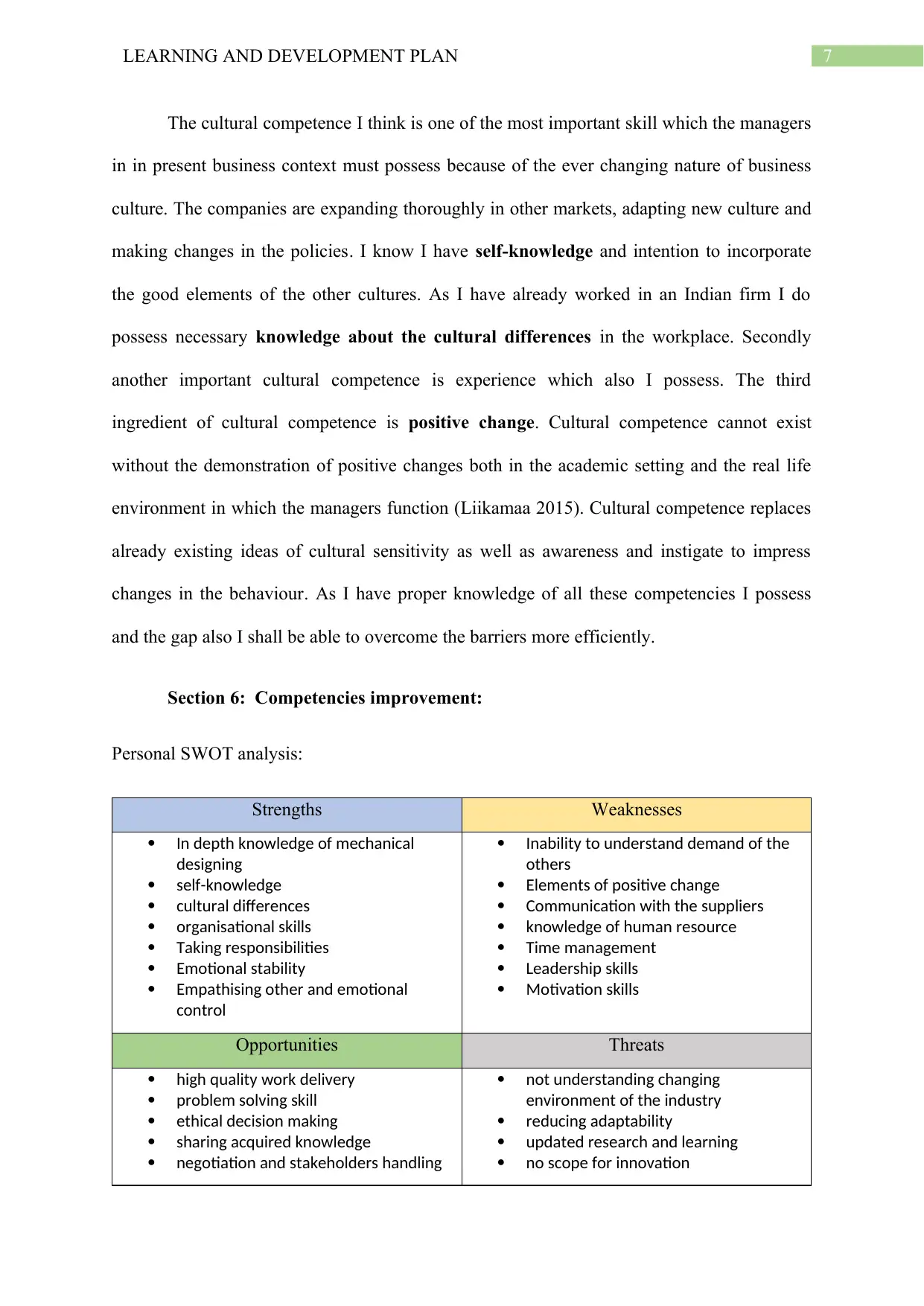
7LEARNING AND DEVELOPMENT PLAN
The cultural competence I think is one of the most important skill which the managers
in in present business context must possess because of the ever changing nature of business
culture. The companies are expanding thoroughly in other markets, adapting new culture and
making changes in the policies. I know I have self-knowledge and intention to incorporate
the good elements of the other cultures. As I have already worked in an Indian firm I do
possess necessary knowledge about the cultural differences in the workplace. Secondly
another important cultural competence is experience which also I possess. The third
ingredient of cultural competence is positive change. Cultural competence cannot exist
without the demonstration of positive changes both in the academic setting and the real life
environment in which the managers function (Liikamaa 2015). Cultural competence replaces
already existing ideas of cultural sensitivity as well as awareness and instigate to impress
changes in the behaviour. As I have proper knowledge of all these competencies I possess
and the gap also I shall be able to overcome the barriers more efficiently.
Section 6: Competencies improvement:
Personal SWOT analysis:
Strengths Weaknesses
In depth knowledge of mechanical
designing
self-knowledge
cultural differences
organisational skills
Taking responsibilities
Emotional stability
Empathising other and emotional
control
Inability to understand demand of the
others
Elements of positive change
Communication with the suppliers
knowledge of human resource
Time management
Leadership skills
Motivation skills
Opportunities Threats
high quality work delivery
problem solving skill
ethical decision making
sharing acquired knowledge
negotiation and stakeholders handling
not understanding changing
environment of the industry
reducing adaptability
updated research and learning
no scope for innovation
The cultural competence I think is one of the most important skill which the managers
in in present business context must possess because of the ever changing nature of business
culture. The companies are expanding thoroughly in other markets, adapting new culture and
making changes in the policies. I know I have self-knowledge and intention to incorporate
the good elements of the other cultures. As I have already worked in an Indian firm I do
possess necessary knowledge about the cultural differences in the workplace. Secondly
another important cultural competence is experience which also I possess. The third
ingredient of cultural competence is positive change. Cultural competence cannot exist
without the demonstration of positive changes both in the academic setting and the real life
environment in which the managers function (Liikamaa 2015). Cultural competence replaces
already existing ideas of cultural sensitivity as well as awareness and instigate to impress
changes in the behaviour. As I have proper knowledge of all these competencies I possess
and the gap also I shall be able to overcome the barriers more efficiently.
Section 6: Competencies improvement:
Personal SWOT analysis:
Strengths Weaknesses
In depth knowledge of mechanical
designing
self-knowledge
cultural differences
organisational skills
Taking responsibilities
Emotional stability
Empathising other and emotional
control
Inability to understand demand of the
others
Elements of positive change
Communication with the suppliers
knowledge of human resource
Time management
Leadership skills
Motivation skills
Opportunities Threats
high quality work delivery
problem solving skill
ethical decision making
sharing acquired knowledge
negotiation and stakeholders handling
not understanding changing
environment of the industry
reducing adaptability
updated research and learning
no scope for innovation
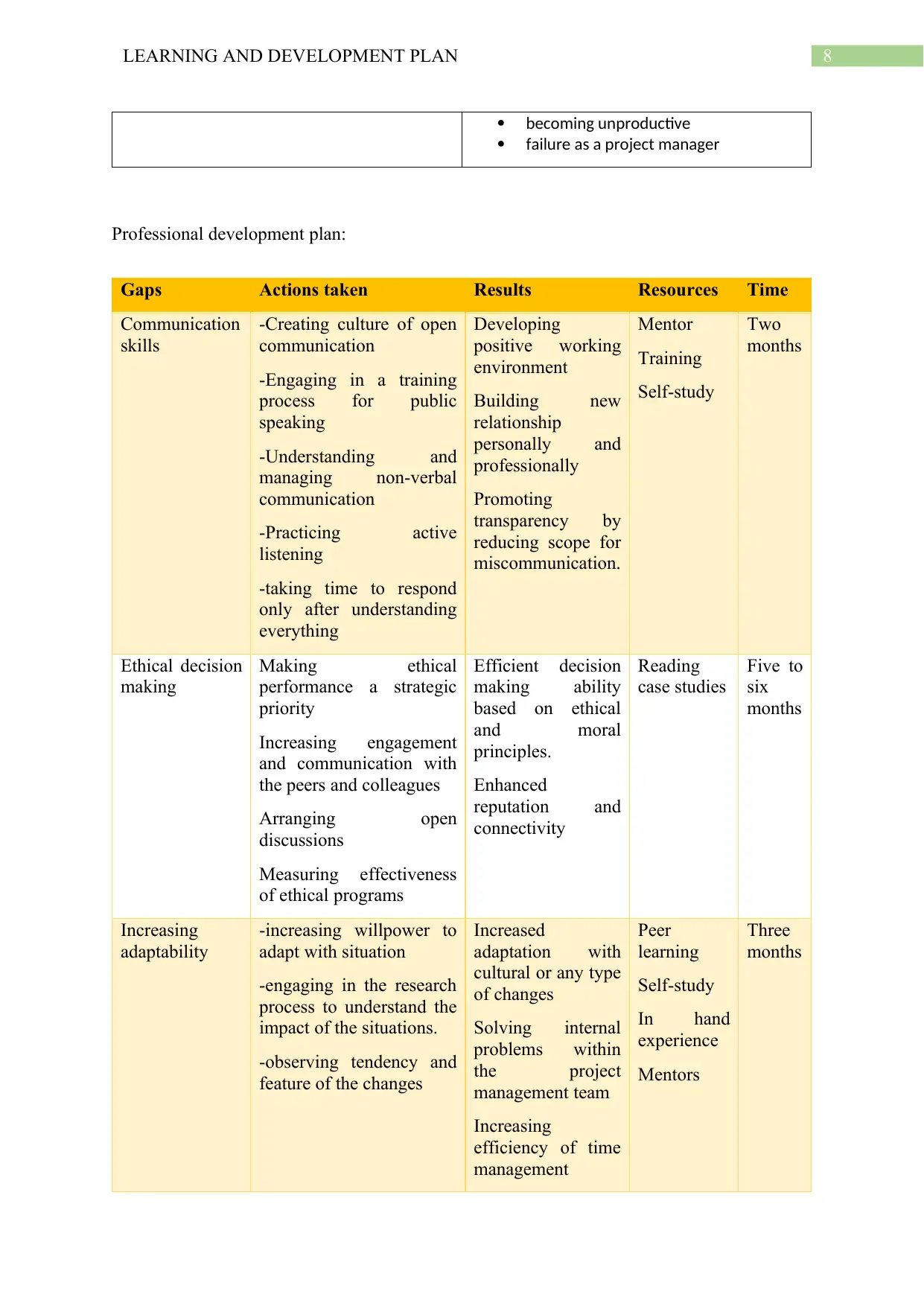
8LEARNING AND DEVELOPMENT PLAN
becoming unproductive
failure as a project manager
Professional development plan:
Gaps Actions taken Results Resources Time
Communication
skills
-Creating culture of open
communication
-Engaging in a training
process for public
speaking
-Understanding and
managing non-verbal
communication
-Practicing active
listening
-taking time to respond
only after understanding
everything
Developing
positive working
environment
Building new
relationship
personally and
professionally
Promoting
transparency by
reducing scope for
miscommunication.
Mentor
Training
Self-study
Two
months
Ethical decision
making
Making ethical
performance a strategic
priority
Increasing engagement
and communication with
the peers and colleagues
Arranging open
discussions
Measuring effectiveness
of ethical programs
Efficient decision
making ability
based on ethical
and moral
principles.
Enhanced
reputation and
connectivity
Reading
case studies
Five to
six
months
Increasing
adaptability
-increasing willpower to
adapt with situation
-engaging in the research
process to understand the
impact of the situations.
-observing tendency and
feature of the changes
Increased
adaptation with
cultural or any type
of changes
Solving internal
problems within
the project
management team
Increasing
efficiency of time
management
Peer
learning
Self-study
In hand
experience
Mentors
Three
months
becoming unproductive
failure as a project manager
Professional development plan:
Gaps Actions taken Results Resources Time
Communication
skills
-Creating culture of open
communication
-Engaging in a training
process for public
speaking
-Understanding and
managing non-verbal
communication
-Practicing active
listening
-taking time to respond
only after understanding
everything
Developing
positive working
environment
Building new
relationship
personally and
professionally
Promoting
transparency by
reducing scope for
miscommunication.
Mentor
Training
Self-study
Two
months
Ethical decision
making
Making ethical
performance a strategic
priority
Increasing engagement
and communication with
the peers and colleagues
Arranging open
discussions
Measuring effectiveness
of ethical programs
Efficient decision
making ability
based on ethical
and moral
principles.
Enhanced
reputation and
connectivity
Reading
case studies
Five to
six
months
Increasing
adaptability
-increasing willpower to
adapt with situation
-engaging in the research
process to understand the
impact of the situations.
-observing tendency and
feature of the changes
Increased
adaptation with
cultural or any type
of changes
Solving internal
problems within
the project
management team
Increasing
efficiency of time
management
Peer
learning
Self-study
In hand
experience
Mentors
Three
months
⊘ This is a preview!⊘
Do you want full access?
Subscribe today to unlock all pages.

Trusted by 1+ million students worldwide
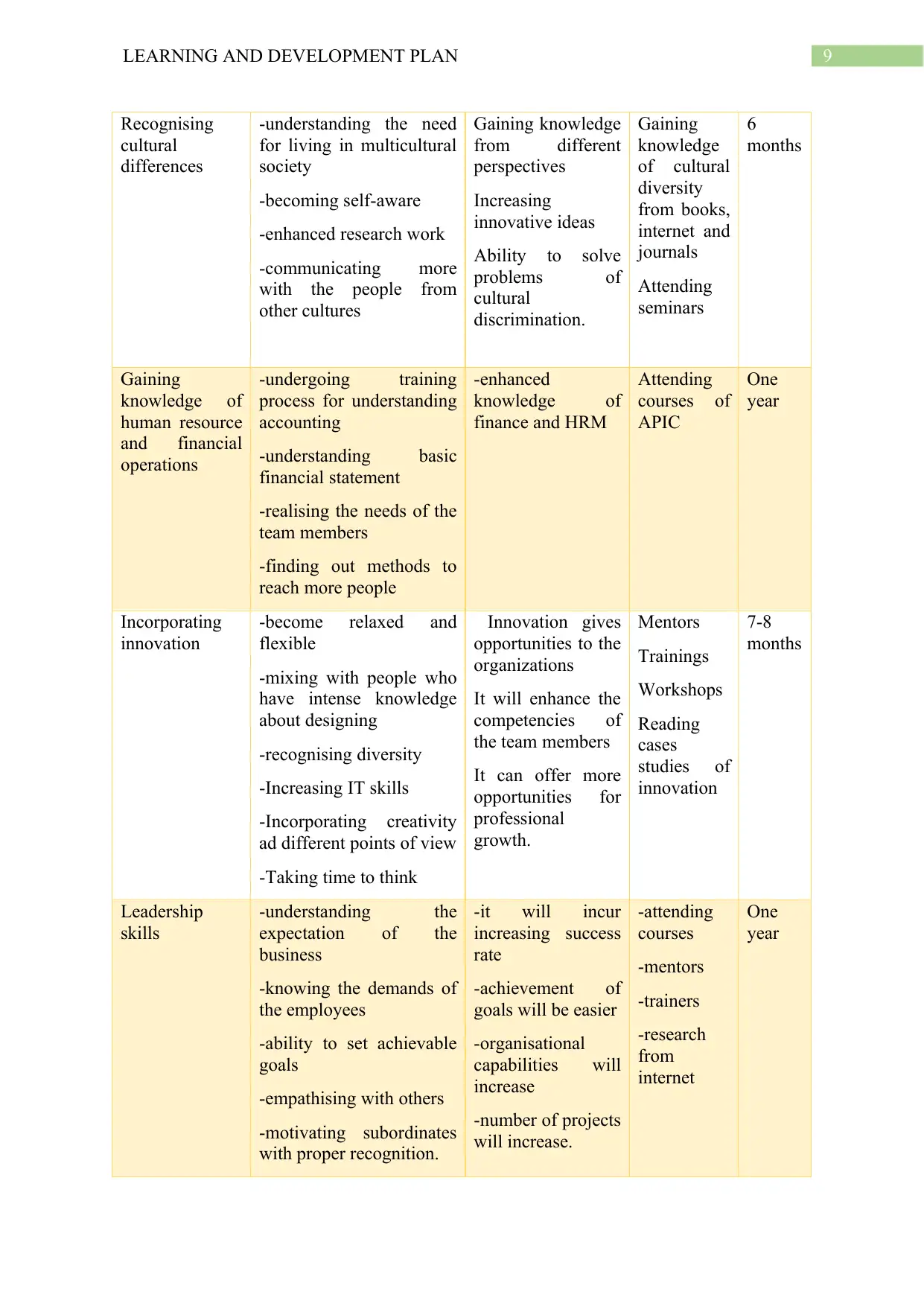
9LEARNING AND DEVELOPMENT PLAN
Recognising
cultural
differences
-understanding the need
for living in multicultural
society
-becoming self-aware
-enhanced research work
-communicating more
with the people from
other cultures
Gaining knowledge
from different
perspectives
Increasing
innovative ideas
Ability to solve
problems of
cultural
discrimination.
Gaining
knowledge
of cultural
diversity
from books,
internet and
journals
Attending
seminars
6
months
Gaining
knowledge of
human resource
and financial
operations
-undergoing training
process for understanding
accounting
-understanding basic
financial statement
-realising the needs of the
team members
-finding out methods to
reach more people
-enhanced
knowledge of
finance and HRM
Attending
courses of
APIC
One
year
Incorporating
innovation
-become relaxed and
flexible
-mixing with people who
have intense knowledge
about designing
-recognising diversity
-Increasing IT skills
-Incorporating creativity
ad different points of view
-Taking time to think
Innovation gives
opportunities to the
organizations
It will enhance the
competencies of
the team members
It can offer more
opportunities for
professional
growth.
Mentors
Trainings
Workshops
Reading
cases
studies of
innovation
7-8
months
Leadership
skills
-understanding the
expectation of the
business
-knowing the demands of
the employees
-ability to set achievable
goals
-empathising with others
-motivating subordinates
with proper recognition.
-it will incur
increasing success
rate
-achievement of
goals will be easier
-organisational
capabilities will
increase
-number of projects
will increase.
-attending
courses
-mentors
-trainers
-research
from
internet
One
year
Recognising
cultural
differences
-understanding the need
for living in multicultural
society
-becoming self-aware
-enhanced research work
-communicating more
with the people from
other cultures
Gaining knowledge
from different
perspectives
Increasing
innovative ideas
Ability to solve
problems of
cultural
discrimination.
Gaining
knowledge
of cultural
diversity
from books,
internet and
journals
Attending
seminars
6
months
Gaining
knowledge of
human resource
and financial
operations
-undergoing training
process for understanding
accounting
-understanding basic
financial statement
-realising the needs of the
team members
-finding out methods to
reach more people
-enhanced
knowledge of
finance and HRM
Attending
courses of
APIC
One
year
Incorporating
innovation
-become relaxed and
flexible
-mixing with people who
have intense knowledge
about designing
-recognising diversity
-Increasing IT skills
-Incorporating creativity
ad different points of view
-Taking time to think
Innovation gives
opportunities to the
organizations
It will enhance the
competencies of
the team members
It can offer more
opportunities for
professional
growth.
Mentors
Trainings
Workshops
Reading
cases
studies of
innovation
7-8
months
Leadership
skills
-understanding the
expectation of the
business
-knowing the demands of
the employees
-ability to set achievable
goals
-empathising with others
-motivating subordinates
with proper recognition.
-it will incur
increasing success
rate
-achievement of
goals will be easier
-organisational
capabilities will
increase
-number of projects
will increase.
-attending
courses
-mentors
-trainers
-research
from
internet
One
year
Paraphrase This Document
Need a fresh take? Get an instant paraphrase of this document with our AI Paraphraser
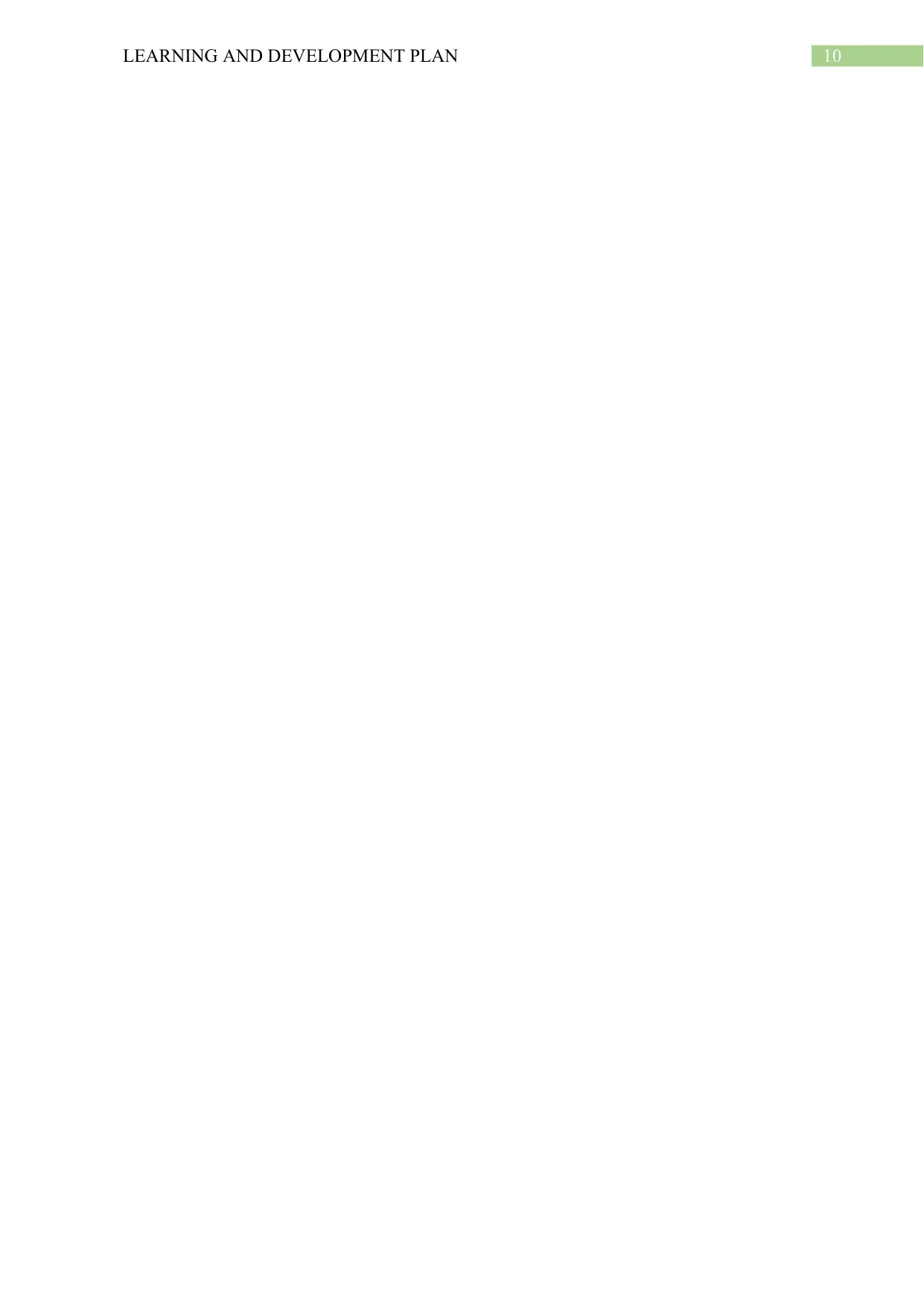
10LEARNING AND DEVELOPMENT PLAN
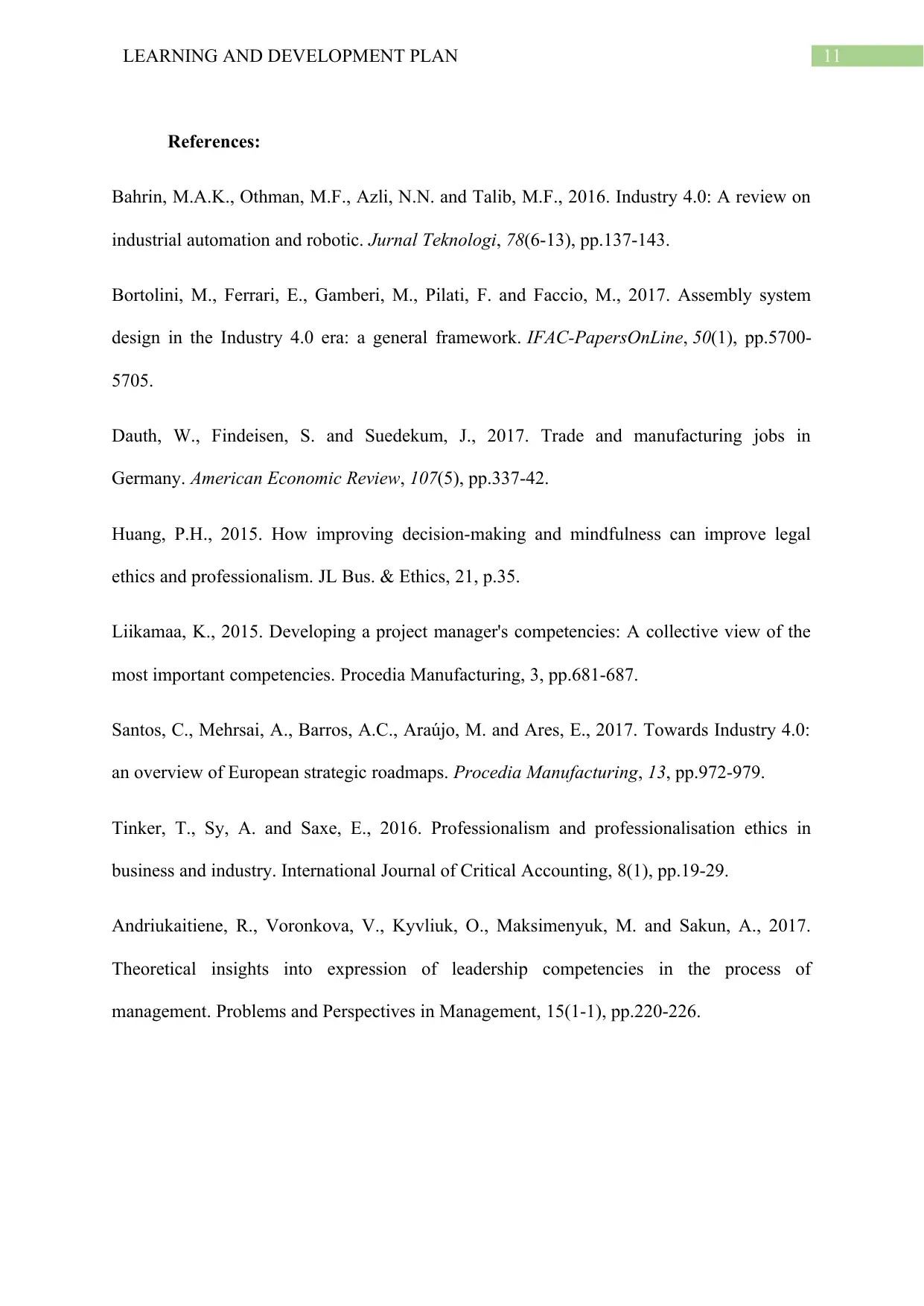
11LEARNING AND DEVELOPMENT PLAN
References:
Bahrin, M.A.K., Othman, M.F., Azli, N.N. and Talib, M.F., 2016. Industry 4.0: A review on
industrial automation and robotic. Jurnal Teknologi, 78(6-13), pp.137-143.
Bortolini, M., Ferrari, E., Gamberi, M., Pilati, F. and Faccio, M., 2017. Assembly system
design in the Industry 4.0 era: a general framework. IFAC-PapersOnLine, 50(1), pp.5700-
5705.
Dauth, W., Findeisen, S. and Suedekum, J., 2017. Trade and manufacturing jobs in
Germany. American Economic Review, 107(5), pp.337-42.
Huang, P.H., 2015. How improving decision-making and mindfulness can improve legal
ethics and professionalism. JL Bus. & Ethics, 21, p.35.
Liikamaa, K., 2015. Developing a project manager's competencies: A collective view of the
most important competencies. Procedia Manufacturing, 3, pp.681-687.
Santos, C., Mehrsai, A., Barros, A.C., Araújo, M. and Ares, E., 2017. Towards Industry 4.0:
an overview of European strategic roadmaps. Procedia Manufacturing, 13, pp.972-979.
Tinker, T., Sy, A. and Saxe, E., 2016. Professionalism and professionalisation ethics in
business and industry. International Journal of Critical Accounting, 8(1), pp.19-29.
Аndriukaitiene, R., Voronkova, V., Kyvliuk, O., Maksimenyuk, M. and Sakun, A., 2017.
Theoretical insights into expression of leadership competencies in the process of
management. Problems and Perspectives in Management, 15(1-1), pp.220-226.
References:
Bahrin, M.A.K., Othman, M.F., Azli, N.N. and Talib, M.F., 2016. Industry 4.0: A review on
industrial automation and robotic. Jurnal Teknologi, 78(6-13), pp.137-143.
Bortolini, M., Ferrari, E., Gamberi, M., Pilati, F. and Faccio, M., 2017. Assembly system
design in the Industry 4.0 era: a general framework. IFAC-PapersOnLine, 50(1), pp.5700-
5705.
Dauth, W., Findeisen, S. and Suedekum, J., 2017. Trade and manufacturing jobs in
Germany. American Economic Review, 107(5), pp.337-42.
Huang, P.H., 2015. How improving decision-making and mindfulness can improve legal
ethics and professionalism. JL Bus. & Ethics, 21, p.35.
Liikamaa, K., 2015. Developing a project manager's competencies: A collective view of the
most important competencies. Procedia Manufacturing, 3, pp.681-687.
Santos, C., Mehrsai, A., Barros, A.C., Araújo, M. and Ares, E., 2017. Towards Industry 4.0:
an overview of European strategic roadmaps. Procedia Manufacturing, 13, pp.972-979.
Tinker, T., Sy, A. and Saxe, E., 2016. Professionalism and professionalisation ethics in
business and industry. International Journal of Critical Accounting, 8(1), pp.19-29.
Аndriukaitiene, R., Voronkova, V., Kyvliuk, O., Maksimenyuk, M. and Sakun, A., 2017.
Theoretical insights into expression of leadership competencies in the process of
management. Problems and Perspectives in Management, 15(1-1), pp.220-226.
⊘ This is a preview!⊘
Do you want full access?
Subscribe today to unlock all pages.

Trusted by 1+ million students worldwide
1 out of 12
Related Documents
Your All-in-One AI-Powered Toolkit for Academic Success.
+13062052269
info@desklib.com
Available 24*7 on WhatsApp / Email
![[object Object]](/_next/static/media/star-bottom.7253800d.svg)
Unlock your academic potential
Copyright © 2020–2026 A2Z Services. All Rights Reserved. Developed and managed by ZUCOL.





